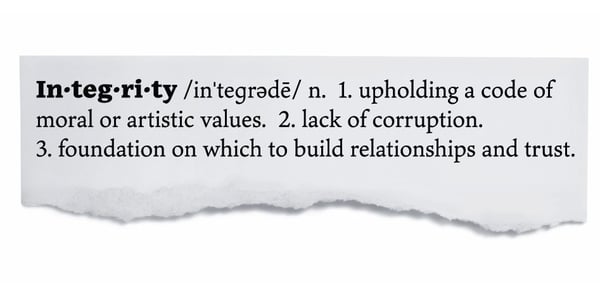
Ethical Company Culture: How to Teach Employees to Act with Integrity
By Carole Wehn
Enron. Tyco. WorldCom. The names of these former corporations are now synonymous with corporate scandals that rocked the business world two decades ago.
Financial fraud and senior executives\’ unethical behavior brought into question many corporations\’ accounting practices and activities. Accordingly, the government enacted legislation to increase investor confidence in financial markets and public companies.
Further, business schools were challenged to introduce business ethics into their curricula to prepare the next generation of corporate leaders to prioritize a desire to “do the right thing” for customers and employees over increasing profits.
Okay, that was twenty years ago, and the big corporations now face greater accountability. So how does that affect me and my business?
Ethics in Company Culture
We all have a moral or ethical framework that guides us in determining right from wrong behaviors. This framework is typically defined early in life, through one\’s parents and upbringing. Our unique framework governs not only our home and community interactions but how we act at work.
Since we each bring our concept of moral framework to the workplace, it’s important to get all employees on the same page through the definition of values, ethics, and behavioral expectations within the organizational culture.
Ethics in the Workplace: 7 Principles to Consider
Business ethics are the code of morals adopted by an organization. Everyone who interacts with the company, including its customers, vendors, and employees, is affected by these ethics. Ethical behavior needs to be the standard for both the company and the employees.
The sales training company Integrity Solutions cites seven principles of business integrity for companies:
- Trust
- Quality
- Follow-through
- Corporate citizenship
- Value creation
- Willingness to change
- Respect
1. Trust
Customers, vendors, and employees want to work with companies they trust and consider dependable and principled. They want to know that the company has their best interests in mind and that they are valued. They want to be sure that the company will support them when things get sticky.
Any trusting relationship is built on consistently showing integrity. Even one instance of failing to act with integrity will cause customers and co-workers to question whether they can count on you.
Demonstrating integrity applies to small as well as large issues. Something that seems as trivial as cutting a few corners in the performance of one’s job can normalize unethical behavior and lead to bigger, potentially illegal, problems.
2. Quality
Customers have almost limitless options for filling their needs and solving their problems. They want to know that the product or service will not only meet their requirements but also that the company providing it will do the right thing to fix a problem should one arise. Customers need to know that products comply with all relevant regulations and laws.
Companies that demonstrate a strong moral code are also committed to providing quality products and services. As noted in an article by the Indeed editorial team:
“Ethical organizations strive to provide excellence by always working to deliver the greatest quality of service or products to their clients and customers. They pursue creativity and innovation, looking for the best ways to deliver their goods and seek to constantly improve their performance, customer satisfaction, and employee morale.”
3. Follow-through
Doing what you say you’re going to do is critical for customers. They need to see that the company will follow through on its commitments and obligations.
Customers also want transparency from companies, especially when there has been an issue. They want companies to own up to problems, accept the consequences, fix the problems, and make it right with all affected parties.
Bill George, former Medtronic CEO and author of the bestselling leadership book True North advises,
“Tell the truth. Even when it’s painful, tell the truth: ‘We had a quality problem with one of our products. This is the consequence. Here’s what we’re doing to fix it.\'”
4. Corporate Citizenship
Corporate citizenship and corporate social responsibility are becoming increasingly important for individuals choosing where to work and with whom to do business. People want to see that companies are socially aware and committed to doing the right thing for society and the environment.
Business and society are mutually dependent, and the actions of business leaders affect not only themselves but customers, employees, investors, vendors, governments, and their communities. The failure of business leaders to respect and serve those who depend upon them threatens trust in business and in the markets needed to ensure their success.
5. Value Creation
Corporate value creation formerly meant increasing shareholder value and profits. But over the last few decades, this has evolved to place a greater weighting on meeting customer needs and making them feel like valued partners.
Ethical companies want to “do the right thing” for their customers and create value for them.
6. Willingness to Change
A willingness to truly listen to customer feedback and incorporate it into improving its products and services is another way that a company shows that it values its customers and treats them as trusted partners.
Company leaders also need to be open to listening to employees and value their input for improving processes and addressing areas of concern.
7. Respect
Everyone wants to be treated with respect, whether they are customers, vendors, employees, or other stakeholders. Respect is demonstrated in the company\’s support of employee diversity, customer privacy, and human rights.
Companies should show fairness and equality in their hiring practices and in competing for new consumers or clients.
But Doesn’t Everyone Do the Right Thing?
While an ethical environment translates into a successful business, not all workplaces encourage or reward moral behavior by their employees.
The Global Business Ethics Survey of 5,000 US employees has been tracking the following ethics outcomes for 20 years: pressure in the workplace to compromise ethical standards; observations of misconduct; reporting misconduct; and ultimately, retaliation perceived by employees after they report misconduct.
Following are five trends noted from their 2020 survey:
- Ethical culture strength remains high, with 20% of employees working in places with strong ethical cultures.
- However, pressure to compromise ethical standards is at the highest it’s been. Employees reported twice the pressure in 2020 compared to three years prior.
- Observed misconduct in the workplace, including conflicts of interest and lying, is starting to inch upwards.
- Eighty percent of employees have reported misconduct at work. Employees stay longer and produce better results when they feel they are working in an ethical environment, so observation of misconduct can lead to unintended turnover.
- Retaliation by management against employees was experienced by 79% of those surveyed.
CultureWise CEO David Friedman notes,
“If we all know that we should do the right thing, why don’t we always do it? Well, there are a number of things that can get in the way and tempt us to do something other than what’s right:
-
- Sometimes doing the right thing could involve revealing a mistake we made, and that could make us look bad.
- Sometimes we’re faced with serious time constraints, and it’s easier to take a shortcut, even if it’s not the right thing to do.
- Sometimes doing the right thing could cost us a lot of money, and after all, no one would know if we didn’t do it.
- Sometimes doing the right thing could involve revealing a mistake we made, and that could make us look bad.
Integrity is most revealed when doing the right thing negatively impacts us, or when nobody’s likely to find out. That’s when our moral compass is truly tested.”
How Do I Get My Employees to Do the Right Thing?
Some of the above principles of business integrity may appear as part of your company’s values. You may even have posters on the wall advocating “Trust” and “Respect.”
But what do they mean to your employees who bring their unique moral frameworks to the workplace? The stated values may not translate into the same ideas or behaviors to each person, as explained in our blog “Corporate Culture: Why Values Aren’t Enough.”
At CultureWise, one of our company Fundamentals, or the behaviors we seek in our team members to reinforce our desired culture, is titled “Do the Right Thing, Always.” The description of this Fundamental behavior is:
Demonstrate an unwavering commitment to doing the right thing in every action you take and in every decision you make, especially when no one’s looking. Always tell the truth. If you make a mistake, own up to it, apologize, and make it right.
Always doing the right thing means consistently acting with integrity. You can’t turn it on when you get to work; it has to be part of your character, your way of thinking and reacting all the time.
As David Friedman notes in his book Culture by Design,
“Acting with integrity is an absolutely essential behavior that we should call out and teach and reinforce for the rest of our careers. As soon as we stop talking and teaching about acting with integrity, we run the risk of unethical behavior beginning to creep into our organizations.”
Talking and teaching about acting with integrity involves coaching employees on the types of behaviors supported by management. It might include presenting scenarios to see how employees would react in a given set of circumstances or asking questions about how they developed their moral compass.
As a manager, the most important thing you can do to reinforce ethical behavior is to exhibit it yourself.
Are you sending signals that it’s okay to record some non-existent sales just to “make the numbers” this quarter? When something goes wrong, do you attempt to “sweep it under the rug” and come up with a cover story? Are your team members afraid to tell you when they\’ve made a mistake for fear of being blamed?
How CultureWise Can Help
Figuring out what is the right thing to do in each situation isn’t always black and white. That’s why talking about and reinforcing the importance of workplace integrity should be an integral part of your organization’s culture.
Just like everything else you’ve successfully done for your company, creating a strong culture requires a good plan.
David Friedman suggests following an eight-step framework:
- Define the employee behaviors that drive your success.
- Ritualize the practice of those behaviors.
- Hire people who are the right fit for your culture.
- Integrate new hires into your culture.
- Communicate your culture throughout your organization.
- Coach to reinforce your culture.
- Lead by example.
- Drive your culture through accountability.
Friedman outlines this process in detail in Culture by Design and offers simple, clear directions about what is needed to complete each phase. You can learn more by reading a free two-chapter download.
Leaders of small companies can internally implement a culture program if they have the right resources. Other business leaders may see the value in this kind of initiative but worry that it would put too much strain on a staff already spread thin.
After devising the process for building culture and writing about it, Friedman developed a system that allows business leaders to easily “operationalize” their culture.
Following the same framework as Culture by Design, The CultureWise standard edition provides an automated process to choose from a list of 60 core behaviors proven to drive success within an organization.
Once selected, the behaviors (called Fundamentals) are then reinforced via a library of content that took years to compile. The inventory is delivered via computer or through an innovative app to smartphones.
It includes:
- Lessons
- Coaching guides
- Teaching points
- e-learning classes
- Daily tips
Find out more about the program by visiting the website, and subscribe to the CultureWise newsletter to learn about the many ways culture impacts business.

